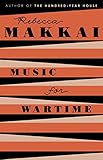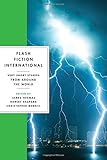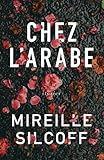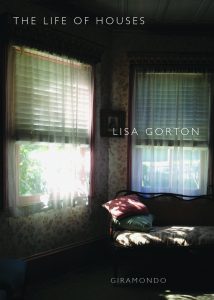 The theme of Makkai’s collection seems to be the surprising, unusual, surrealistic, and supernatural. It is probably no accident that she starts the collection with a fable, since fables are by definition about the unusual and supernatural. The pogrom/war/ethnic cleansing stories involve startling occurrences, and so do the stories set in contemporary America.
The theme of Makkai’s collection seems to be the surprising, unusual, surrealistic, and supernatural. It is probably no accident that she starts the collection with a fable, since fables are by definition about the unusual and supernatural. The pogrom/war/ethnic cleansing stories involve startling occurrences, and so do the stories set in contemporary America.
Category: Literary Fiction Reviews
Beth Spencer on Vagabondage
Award winning novelist, poet and nonfiction writer Beth Spencer reads from and talks about her latest poetry book,Vagabondage. In this candid conversation we discuss her own journey, the idea of “leaving no trace”, about aging, displacement, homelessness, her writing processes,…
A review of Flash Fiction International edited by James Thomas, Robert Shapard and Christopher Merrill
 “Night Drive” by Rubem Fonseca of Brazil is a Stephen Kingish story that shows the Mr. Hyde side of a seemingly benign Dr. Jekyll. Another story that I admire, “The Snake” by Eric Rugara of Kenya, is, on the surface, a picture of family cooperation to band together promptly to rid their home of a snake. It may also be a metaphor for the power of united action against any creeping threat. With eighty-six stories to choose from it is easy for a reader to find something s/he likes in this collection.
“Night Drive” by Rubem Fonseca of Brazil is a Stephen Kingish story that shows the Mr. Hyde side of a seemingly benign Dr. Jekyll. Another story that I admire, “The Snake” by Eric Rugara of Kenya, is, on the surface, a picture of family cooperation to band together promptly to rid their home of a snake. It may also be a metaphor for the power of united action against any creeping threat. With eighty-six stories to choose from it is easy for a reader to find something s/he likes in this collection.
Graham Stull on The Hydra
The author of The Hydra reads from and talks about his new novel and where his ideas for it came from, about his biologist turned Frankenstein protagonist Brian Matterosi, on viral engineering, genre fiction, indie publishing, distopias, population and ecology,…
Ben Okri on The Age of Magic
Ben Okri joins us live from the Sydney Writers Festival to read from and talk about his latest novel The Age of Magic and what inspired it, its characters, on the true nature of magic, on the book’s themes incuding what Goethe calls des…
A review of Entrevoir by Chris Katsaropoulos
 The book feels earnest. It pulls the reader along. From the beginning Jacob’s transformation/journey is about the role of artist as seer and priest in the world. Ideas of reincarnation, Identity, and the Self or Cosmic spirit all come together in an attempt to sing of life and time.
The book feels earnest. It pulls the reader along. From the beginning Jacob’s transformation/journey is about the role of artist as seer and priest in the world. Ideas of reincarnation, Identity, and the Self or Cosmic spirit all come together in an attempt to sing of life and time.
Joan Schweighardt on The Accidental Art Thief
The author of The Accidental Art Thief reads from and talks about her new novel and the inspiration for it, her quirky “under-the-radar” characters, her gorgeous Albuquerque setting, some of her key themes, on keeping secrets, her new work in progress, and…
A review of The Age of Magic by Ben Okri
 However, if you let go of preconceptions about what a novel should be and how it’s meant to function, and read the work, instead, as a literary exploration of the unseen, beyond the world of logic and progression, then the work becomes much more powerful, yielding a transcendence that moves beyond the flow of ordered progression. The work moves in pulses; in moments of magic that become “elixirs, life renewed in the laboratory of Arcadia” or humanity’s highest self.
However, if you let go of preconceptions about what a novel should be and how it’s meant to function, and read the work, instead, as a literary exploration of the unseen, beyond the world of logic and progression, then the work becomes much more powerful, yielding a transcendence that moves beyond the flow of ordered progression. The work moves in pulses; in moments of magic that become “elixirs, life renewed in the laboratory of Arcadia” or humanity’s highest self.
A review of Chez l’arabe by Mireille Silcoff
 The eight stories in Mireille Silcoff’s collection, Chez l’arabe have a common theme, the shock and confusion we feel when faced with a nasty twist of fate. The central character of “Champ de Mars” is very human in her belief that the terrible pain she suffered over her child’s death “would absolve her from future hardship…she’d absorbed the blow, remained upright. Surely, for this, some kind of immunity?” Alas, life seldom works out that way, though some of Silcoff’s fictional characters fare better than others.
The eight stories in Mireille Silcoff’s collection, Chez l’arabe have a common theme, the shock and confusion we feel when faced with a nasty twist of fate. The central character of “Champ de Mars” is very human in her belief that the terrible pain she suffered over her child’s death “would absolve her from future hardship…she’d absorbed the blow, remained upright. Surely, for this, some kind of immunity?” Alas, life seldom works out that way, though some of Silcoff’s fictional characters fare better than others.
A review of The Life of Houses by Lisa Gorton
 Though the book reads quickly, it’s denser than it feels. As a reader, I felt it was necessary to slow down my reading so I could notice all the descriptive detail and the power in each word in The Life of Houses, allowing the story to unfold at its own rhythm and get fully under the skin. This is an utterly beautiful and somewhat sad story that grows in power with re-reading as it strikes at the heart of human relationships, families, self-perception, and how we make meaning in our lives.
Though the book reads quickly, it’s denser than it feels. As a reader, I felt it was necessary to slow down my reading so I could notice all the descriptive detail and the power in each word in The Life of Houses, allowing the story to unfold at its own rhythm and get fully under the skin. This is an utterly beautiful and somewhat sad story that grows in power with re-reading as it strikes at the heart of human relationships, families, self-perception, and how we make meaning in our lives.